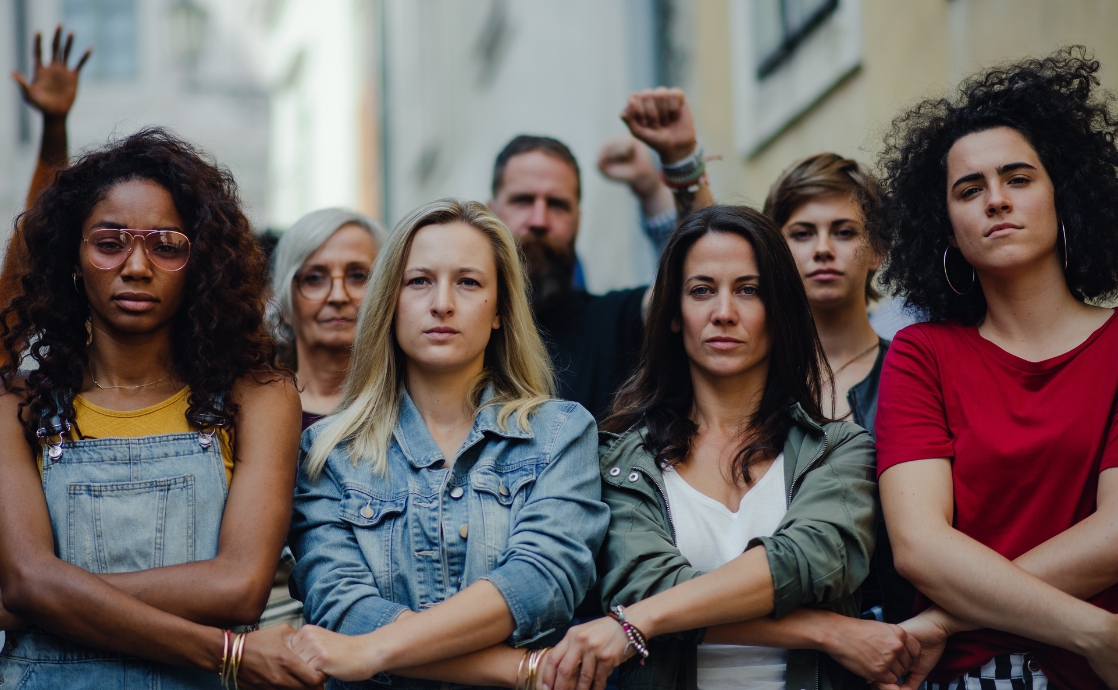The views expressed in our content reflect individual perspectives and do not represent the authoritative views of the Baha'i Faith.
On this International Women’s Day, as I reflect on the recent brutal treatment of women worldwide, I can’t help but wonder at the kind of courage it takes to stand up in the face of such prolific injustice.
I am reminded of one intensely courageous young woman who unequivocally drew the line of her equality in the sand nearly 200 years ago. In 19th century Persia, Tahirih, a beautiful young poet and follower of the Bab — the forerunner of Baha’u’llah — removed her veil in public.
This revolutionary act proclaimed a new age of the emancipation of women.
Before her assassination, Tahirih proclaimed: “You can kill me as soon as you like,” she powerfully asserted to her executioners, “but you will never stop the emancipation of women.” In 1852, at the age of 38, Tahirih was brutally executed for her beliefs.
Since then women have struggled to obtain their equality and freedom in virtually every country on the planet.
RELATED: If We Want War to End, We Need Women to Lead
The Women of Afghanistan
The global relief agency the International Rescue Committee (IRC) is acutely alarmed about the situation in Afghanistan for women and girls. According the IRC, in December 2022, universities in Afghanistan were closed to women and girls, taking a chilling step backward for the country. Because of 40 years of war, climate change-driven natural disasters, chronic poverty, and COVID-19, 75 per cent of those in need of humanitarian assistance are women and children.
Today, the intensity of abuse, domestic violence, and exploitation is increasing for Afghani women.
“We know that during times of crisis, violence against women and girls increases,” IRC vice president Elinor Raikes said. “With uncertainty mounting throughout Afghanistan, the IRC is concerned that we could see an increase in violence against women as well as an increase in child marriage.”
These places in the world where women have few rights and suffer discrimination and abuse must change, the Baha’i teachings say. Abdu’l-Baha, in a speech he gave in the United States more than a century ago, affirmed that:
Equality of the sexes will be established in proportion to the increased opportunities afforded woman in this age, for man and woman are equally the recipients of powers and endowments from God, the Creator. God has not ordained distinction between them in His consummate purpose.
The Women of Africa, the Middle East, and Asia
According to the World Health Organization (WHO), 30 countries in Africa, the Middle East, and Asia routinely practice Female Genital Mutilation (FGM). More than 200 million girls and women alive today in these countries have been inhumanely cut against their will, according to the WHO:
FGM is recognized internationally as a violation of the human rights of girls and women. It reflects deep-rooted inequality between the sexes, and constitutes an extreme form of discrimination against women. It is nearly always carried out on minors and is a violation of the rights of children. The practice also violates a person’s rights to health, security and physical integrity, the right to be free from torture and cruel, inhuman or degrading treatment, and the right to life when the procedure results in death.
This barbaric cutting is not only extremely painful, but carries a constant risk of serious infection, bladder issues, and deadly reproductive consequences for women. The Baha’i teachings have long called for such gross mistreatment of women to stop, as Abdu’l-Baha explained in Montreal in 1912:
… there must be an equality of rights between men and women. … For the world of humanity possesses two wings: man and woman. If one wing remains incapable and defective, it will restrict the power of the other, and full flight will be impossible. Therefore, the completeness and perfection of the human world are dependent upon the equal development of these two wings.
RELATED: 6 Unique Ways the Baha’i Faith Gives Women Agency
The Women of Iran
An appalling outpouring of violence toward women is now underway in Iran. The past year brought a distinct surge in the executions of women – seven women were violently executed in just one month, which set a new record even for Iran.
One 22-year-old Iranian woman named Masha Amini died after being arrested and beaten for allegedly violating strict hijab rules. This sparked demonstrations and protests against the Islamic Republic’s morality police, according to the BBC. Witnesses accused police of beating Amini inside a van as she was led to a detention center. Young Masha later died at a hospital after three days in a coma.
On March 3rd 2023, multiple news organizations reported on suspected poison gas attacks affecting hundreds of schoolgirls in Iran. The obvious motive: to close all schools to girls throughout the country. The poisonings began in November of 2022, making more than 1000 girls severely ill since then. The United States Commission on International Religious Freedom stated that “extremist religious groups operating in the country support a ban on education for girls and women.”
In protest, the courageous women of Iran have taken to the streets, and are now suffering the brutality of security forces. A popular killing method from the government for these heroic women is repeated blows directly to the head as well as blinding the women and female children with metal pellets.
The horror of these kinds of violent oppression of women include the recent beheading of Mona Heydari, a child bride. Her horrific death has stunned the world. The 17-year-old mother was violently murdered by her husband, Sajjad Heydari, in the culmination of an relentless wave of honor killings and femicides in Iran over the past few years. Sajjad and his brother tied Mona’s hands and feet and heartlessly beheaded her. Sajjad took Mona’s head and walked down the street with a knife in his hand. According to the commander of the State Security Force (SSF) in Ahvaz, the motive for the murder was “family differences!”
Armita Abbasi is a 20-year young woman who liked to take videos of her cats on TikTok. Though it is still unclear that she even took part in any protests, she was active on social media. Abbasi was arrested in her hometown of Karaj, approx. 1 month after the protests began. On October 17, 2022, Abbasi was rushed to Iman Ali hospital in Karaj. According to a report from CNN:
She was accompanied by plainclothes officers, according to leaks from that hospital. Her head had been shaved and she was shaking violently. In the accounts, the medical staff attending to her spoke of the horror they felt when they saw evidence of brutal rape. An insider at Iman hospital confirmed the veracity of those leaks to CNN. The source asked to remain anonymous for security reasons. “When she first came in, (the officers) said she was hemorrhaging from her rectum … due to repeated rape. The plainclothes men insisted that the doctor write it as rape prior to arrest,” wrote one member of the medical staff in one of the messages. After the truth became obvious to all, they changed the whole script,” wrote the medic. CNN can confirm that four to five medics leaked the messages to social media. All of them said they believed she was sexually assaulted in custody.
RELATED: Why It’s Important to Discuss Gender Inequality with Teens
The Women in Developed Countries Are Victims, Too
Surprisingly, out of the 77 countries that reported to the United Nations, Sweden, the U.K., Botswana, and Australia had the highest reported rates of sexual violence. Specifically, the U.S. has especially high rates of rape. In a United Nations-funded survey of more than 10,000 men, the most common reasons for rape included sexual entitlement, entertainment, and as a way to punish women.
A recent United Nations report clearly outlines 17 ways that progress for gender equality and women’s rights look bleak. Women are disproportionately affected with regard to educational opportunities, poverty, health, well-being, security, job opportunities, and representation in government. In COVID research (as in many areas), just 4% of clinical studies bothered to even consider the female sex. The outcome is that more women are dying from COVID. Also, data from a recent UN report on femicide shows that women account for 82 percent of victims killed by their partner or ex-partner.
This year’s United Nations Commission on the Status of Women report from the Baha’i International Community (BIC) stated:
The Commission affirms that violence against women and girls is rooted in historical and structural inequality in power relations between women and men, and persists in every country in the world as a pervasive violation of the enjoyment of human rights.
It’s been 171 years since the accomplished young Tahirih courageously removed her veil in public, and surprisingly, for many women not much has changed since. This does not only describe any one country or government – gross gender inequity clearly occurs worldwide.
As in any form of discrimination, humanity needs to be educated about these atrocities, however uncomfortable that might make us. We need laws to protect these women, and real consequences for those who break them. The Baha’i teachings tell us that until women attain their freedom, equality, and an equal place at the world table, progress on Earth for women and men will not advance:
For the world of humanity consists of two parts or members: one is woman; the other is man. Until these two members are equal in strength, the oneness of humanity cannot be established, and the happiness and felicity of mankind will not be a reality. God willing, this is to be so.
















Comments
Sign in or create an account
Continue with Googleor